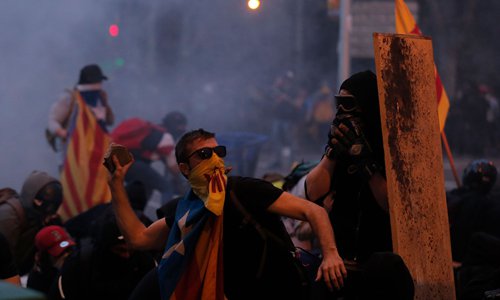HOME >> OPINION
Emulating HK violence by Catalan protesters will only meet with severe condemnation
By Gu Chen Source:Global Times Published: 2019/10/19 15:22:51

Photo: VCG
After nine Catalan separatist leaders were sentenced to up to 12 years of imprisonment, Catalan separatists, unhappy with the verdict, began to express their dissatisfaction through protests.
Their response is not surprising, and as citizens of a democratic country, they have the right to carry out such political protests common across democracies.
But as a Chinese, I was concerned about the situation in Catalonia, more than 10 hours away from Beijing, not just because the street protests in Catalonia have been hijacked by extremist groups resulting in violent turn of events, but because the perpetrators of riots in China's Hong Kong Special Administrative Region are celebrating Catalonia's violence, which they believe is an emulation of what transpired in Hong Kong.
I must remind the Catalan protesters that copying Hong Kong's riots will not help your "cause". It will only act as toxic.
This is primarily because, on a larger international political level, the riots on the streets of Hong Kong are supported and even condoned by British and American politicians, including the media. It is because Hong Kong is part of China and they see China as a rival to the Western political system. They portrayed riots against the Chinese system and its supporters as a romantic revolution.
But Catalonia is different. Spain is recognized by the West as a democratic country and a country that does not pose any threat to the West-dominated world order. Spain finds very little attention in the Western public opinion. When a flag supporting Catalan independence was displayed in the opening ceremony of a recent NBA game, it found minimal mention in Western media.
So if Catalans are to follow Hong Kong's example of the months of violence on the streets, they are unlikely to get the kind of glorifying coverage and attention from the Western media, let alone the support of politicians from major Western countries.
Secondly, those protests on the streets of Hong Kong are not only disrupting public transport, blocking roads and airports, which is called "be water", but they are also inflicting xenophobia and reverse racism.
For instance, rioters in Hong Kong target Chinese from the mainland or other Mandarin-speaking Chinese; however, would greet white people with a smile. When people who disagree with their views exercise their democratic right to freedom of speech, they are not only meted with violent assaults but often their family's privacy is endangered.
While these abuses are rarely reported by the Western media, a growing number of people who witnessed these brutalities in Hong Kong have shared them on social media. Robert Ovadia, a journalist from Channel 7 of Australia, has personally experienced cyber violence when he just reported Hong Kong mobs assaulting an entertainer who held dissenting opinion.
The strategy of blocking traffic and seizing the airport in Hong Kong was lauded by British and American media and politicians, but when the British environmental group Extinction Rebellion began to use a similar strategy, there was an immediate crackdown by the London police.
Whilst Spain's constitution forbids the independence of Catalonia as a separate nation, the regional government of Catalonia declared independence in 2017 on the basis of a referendum that saw less than 43 percent turnout. None of this is good for the Catalan separatists be it on a legal or on a democratic level. Any violence would not increase their chances of international recognition.
If they want to follow Hong Kong's example of street violence and social disorder, suppress dissenting voices, unleash violence on civilians from other Spanish regions, they would only attract widespread condemnation.
But it is comforting to note that most of the participants and supporters of the Catalan separatist movement have not condoned the violence on their streets, but have condemned it even when it just started.
The reason why violence in Hong Kong's streets lasted this long is because the so-called peaceful and rational protesters on the streets of Hong Kong have refused to condemn the violence of extremist groups. With support from the Western media and politicians, they continuously condoned the riots.
But when it comes to the issue of Catalan independence, which British and American media and politicians are bound to take a different view on, if Catalonia's separatists insist on emulating Hong Kong, they will only be ruthlessly condemned.
The author is a Beijing-based freelance commentator. opinion@globaltimes.com.cn
Posted in: VIEWPOINT